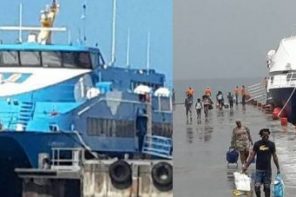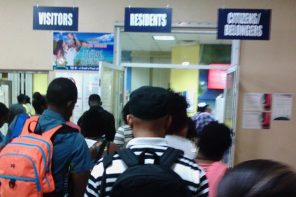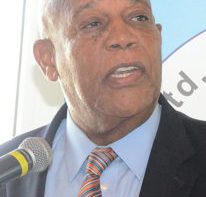Castries Constituency Council Launches Plastic Collection Project
The Castries Constituency Council (CCC), on May 10, launched its Plastic Collection Project, which it hopes will inspire people to work together for a better image of the city and be more environmentally-conscious.
According to Castries Mayor, Peterson Francis, the Clean City Campaign forms part of a broader national campaign aimed at making Castries one of the cleanest and greenest cities in the region by addressing the problem of inconsiderate littering.
Garbage bags will be made available from Monday to Friday from 8:00 a.m. to 4:00 p.m. at the City Police Department. Members of the public can visit the Department, pick up a bag and fill it solely with plastics and Styrofoam: plastic bottles and cups and Styrofoam cups and plates.
Filled bags can be returned to the CCC where a card redeemable for $5.00 will be given to the person presenting each bag. The bags will then be deposited at the Deglos landfill.
Francis said the CCC is looking towards recycling those plastics for shipment abroad. This is definitely a step in the positive direction as over the years one of the hindrances to achieving that goal was deemed to be the infeasibility of investing in specialized machinery to recycle plastics in Saint Lucia.
The project has been hailed as a bold move by the CCC, which has been criticized over the years for not formulating a comprehensive plan to arrest the high level of littering in the city. While central government has for nearly a decade now promised to introduce a measure in Parliament to allow for a refund on empty plastic bottles, nothing concrete has been achieved in that regard.
Styrofoam and plastics, used mainly in the food and beverage industry as containers, take as much as 500 years to bio-degrade. The negative effects of dumping them along the city’s byways are part of the national lore.
For starters, these non-biodegradable items often end up blocking the city’s waterways, presenting a grave danger to marine life and projecting an unsightly image for a city boasted as having an enviable beauty across the region. Also, the city’s drainage system becomes clogged, thereby creating the perfect scenario for flooding, especially during a major hurricane or tropical storm.
Ever since the #1.5ToStayAlive movement gained ground in 2015 – spurred by the climate change talks leading up to and following the landmark climate change deal brokered in Paris that year – Saint Lucia has reiterated its commitment to reducing on its carbon footprint. Mayor Francis believes that realizing that goal is everyone’s job.
“We need to shoulder our responsibility and make the city of Castries a cleaner and more beautiful place,” he said at the launch of the project. “We will and must support sustainable, promising innovations wherever we can. I don’t have to convince this audience that plastics don’t belong on our streets, in our drains, or in our oceans. So for us preventing pollution in the first place is an even better option.”
In March 2016, the government of Guyana declared that as of April 1 that year the importation of Styrofoam into Guyana would cease. Further, the Ministry of Finance in the South American nation was considering offering tax incentives to importers who considered importing alternatives.
In January that same year, Antigua & Barbuda placed a ban on the importation of plastic bags – except for those used in garbage collection and disposal. The government also said it was willing to waive duties and other taxes to assist private sector companies that chose to import and use alternatives. ¤



